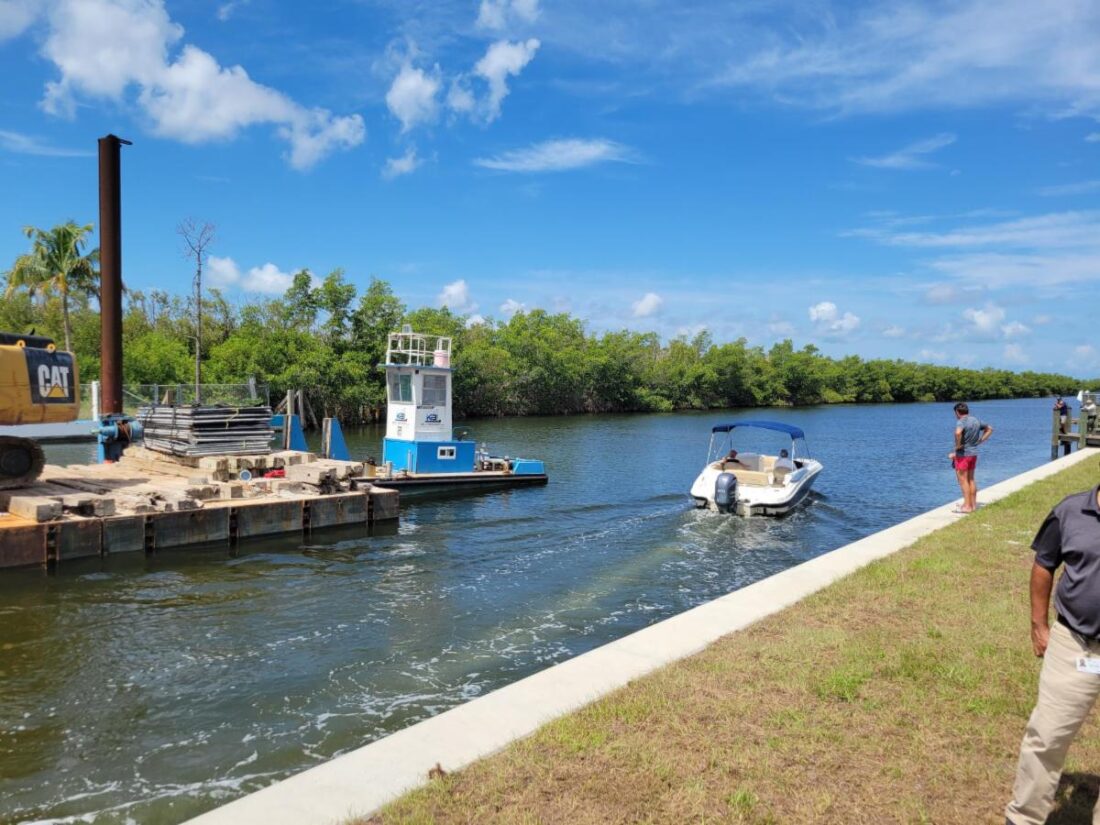The city of Cape Coral completed its removal of the Chiquita Lock ahead of schedule in June. PROVIDED BY THE CITY OF CAPE CORAL
The city of Cape Coral’s bid to recoup more than $2 million in legal fees from three Cape Coral residents who contested the removal of the Chiquita Lock has been quashed because the city’s outside counsel failed raise the issue of reimbursement at the proper time.
The First District Court of Appeal found that the state’s Department of Administration Hearings did not have jurisdiction to address the city’s fee motion belatedly.
“…Bottom line, the City as the movant was responsible for its own fee motion, but let it fall between the procedural cracks. There is no do-over. QUASHED,” the three-judge panel’s opinion states.
J. Michael Hannon, who represented Daniel Carney, James Collier and Kevin Sparks in their case contesting the city’s bid to remove the water control device in the South Spreader, said the residents who have come to be known as “the three fishermen” are relieved.
“These three civic-minded sportsmen personally appeared before the City Council on several occasions to show they acted in good faith and in the highest traditions of a citizen’s right to seek redress against the government,” Hannon said. “Yet, the City Council and its City Attorney refused to restrain its outside counsel from taking actions against them which the Court of Appeal makes clear were unlawful. We sincerely hope this is the end of such a vindictive distortion of the law.”
The full judicial opinion, which cites legal precedence, states that the administrative law judge who heard the city’s original case did not have the jurisdiction to subsequently consider the city’s belated request for reimbursement.
“The functional equivalent of these two cases combined happened here. The City failed to set a hearing or get a ruling on its own motion for fees before the ALJ lost jurisdiction to the agency. The ALJ nevertheless sua-sponte issued a ‘corrected’ order while the agency held jurisdiction-and without making the finding of improper purpose required under section 120.595(1)(d): ‘the recommended order shall so designate.’ Contrary to the statutory mandate, the ALJ expressly declined to ‘so designate.’ This adversely affected Petitioners’ substantive rights, and expanded the City’s, without a full hearing and at a time when the agency had exclusive jurisdiction and had made no such ruling. Because the ‘corrected’ ALJ order was an unauthorized substantive change, the agency lacked authority to ‘adopt’ it in any event. Bottom line, the City as the movant was responsible for its own fee motion, but let it fall between the procedural cracks. There is no do-over. QUASHED.”
The finding is not final until the window for post-opinion motions for rehearing or clarification by the judicial panel, or for a hearing by the full court of appeal, has passed. The deadline is 15 days from the date of the appellate opinion, which is dated Oct. 29.
The Breeze has reached out to the city for comment and its next step, if any.
After a filing by the residents, the First District Court of Appeals stayed the city’s effort to recoup legal expenditures in January. As a result, the administrative law judge canceled a final hearing regarding fee reimbursement that had been scheduled for Feb. 24-28.
The proceeding remained in abeyance while the appeals court determined whether the Department of Administration Hearings had the jurisdiction to determine whether the challenge to remove the lock was frivolous or filed with malicious intent, a necessary legal finding for the city to recoup what was then just shy of $2 million.
As of May, that number had crept to about $2,098,670.
Carney, Collier and Sparks have maintained that their challenge was spurred by environmental concerns, pointing out that the city lost its first bid to remove the lock.
Collier, a 20-year Cape resident and former chairman of the city’s Waterway Advisory Board, had said that they wanted the lock system — inoperable since Hurricane Ian and since removed — replaced with a new, more modern and faster system.
Their argument was that the lock provided storm surge and water quality protection.
After a five-day hearing late last year, the administrative law judge voted in favor of the city, which then sought to recoup its legal fees through the same administrative law judge, Suzanne Van Wyk, with the DOAH’s Tallahassee office.
The petitioners contended that she no longer had jurisdiction in the case as she had issued a recommended order. The recommended order found for the city in its removal effort but was issued without reference to any improper purpose as required by state statutes, contained no findings of frivolousness as required by state statute, did not award fees, and did not reserve any jurisdiction to make any of these findings or award fees later, their petition to the First District Court of Appeals stated.
The First District Court of Appeal opinion issued today addressed the jurisdiction issue.
“Petitioners seek review of an administrative law judge’s order setting a hearing on the City of Cape Coral’s motion for attorneys’ fees as a sanction for Petitioners’ allegedly untimely filing of their petition below. The procedural problem is that before the case went back to the agency for final merits disposition, the City never requested, and the ALJ never held-nor reserved jurisdiction to hold-a hearing on the fee motion. The agency declined the City’s request to remand for fee proceedings. In this posture, the ALJ had no jurisdiction over the issue.”
Editor’s note: This is an evolving story. It will be updated with quotes from the plaintiffs and the city, if received.
To reach VALARIE HARRING, please email vharring@breezenewspapers.com

